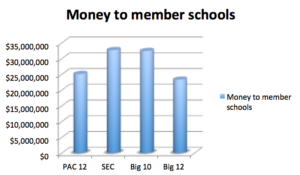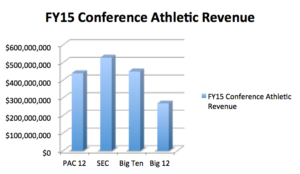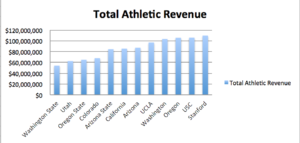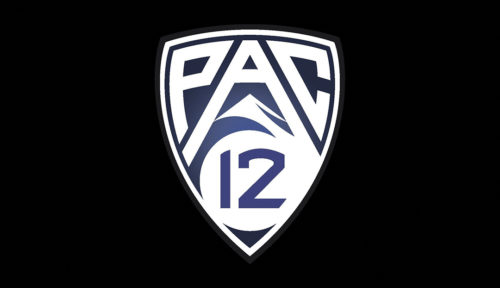By MICHELLE FLOYD
Arizona Sonora News
Let’s talk about everybody’s favorite subject: money.
Not your money, don’t worry, but the finances of the Pacific-12 conference, also known as the PAC 12. Originally known as the PAC 10, the conference added two schools: the University of Utah and the University of Colorado back in 2011. PAC 12 also started its own television network the same year.
It shows that where there is athletic success, there is money
We are going to take this from the top, with the total revenue. In the last report, the FY15 numbers were released in May in tax records that were released to CBS Sports, which state that there was $439 million in revenue from TV rights, bowl games, NCAA tournament, advertising, investments, and grants as well as $25.1 million distributed to each of the member schools. Due to the fact that these are the FY15 numbers, we cannot easily compare them to the Big Ten and SEC conferences because they were released about 10 months after the FY15 and others have moved on into FY16 and FY17.
On a side note, this revenue comes from the PAC 12 schools participation in bowl games, the NCAA tournament, advertising, etc.. Not from the schools themselves. Once all the money is totaled up in the conference from the revenue, portions of it will be distributed out to the member schools, giving their athletic departments money to work with as well.
 Taking a closer look at the FY15 numbers from the other conferences, the SEC takes the lead with $527.4 million with $32.7 million given to each member school. Up next is the Big Ten whose total revenue was at $448.8 million and $32.4 million for each school. Following next is the PAC-12 who we already covered, but coming in fourth place is the BIG 12 who had $267.8 million in revenue with $23.3 million distributed to each school.
Taking a closer look at the FY15 numbers from the other conferences, the SEC takes the lead with $527.4 million with $32.7 million given to each member school. Up next is the Big Ten whose total revenue was at $448.8 million and $32.4 million for each school. Following next is the PAC-12 who we already covered, but coming in fourth place is the BIG 12 who had $267.8 million in revenue with $23.3 million distributed to each school.
Next, let’s break down the pay of the top dogs, the commissioner of the conference. Although the PAC 12 conference is behind the SEC in money earned, PAC 12 commissioner Larry Scott leads all commissioners in pay with $4 million (from the 2014-15 tax numbers). From here, the next highest paid commissioner earned $3.6 with SEC commissioner Mike Slive, who recently completed his last year, then Big 12 commissioner Bob Bowlsby who earned $2.6 million.
Other high paid executives within the PAC 12 are Lydia Murphy Stephens, who is currently the president of PAC 12 Networks who earned $1,247,233. Next up is Arturo Marquez, senior vice president of affiliate sales, who earned $597,918. Then we have Neil Davis, who is the executive vice president of sales, who made $568,493. In total, with other PAC 12 executives, totaled more than $300,000 in compensation from July 1, 2014 to June 30, 2015. The numbers are even higher than the associate commissioner of the SEC, Mark Womack, who earned $427,636 according to the tax return from the SEC that was released to CBS Sports.
Given that many PAC 12 sports are broadcast on TV, here is a look at where the network took PAC 12 and other conferences in their finances. According to the PAC 12 tax return analyzed by CBS Sports, the PAC 12 returned $116.6 million to the conference. This later leads to about 69 percent of revenue getting distributed back to the member schools. The interesting aspect of the PAC 12 network compared to the other sports networks like the SEC and Big Ten channels is that PAC 12 network is the sole owner of its network. Networks in the other power five conferences are said to distribute about 80 to 95 percent of the their return back to their school.
The PAC 12 Conference gains its revenue from multiple sources, including $298.6 million from TV rights and $80.1 million for the post-season bowl games. This revenue helped the conference finish with a surplus of almost $4 million, after $435.1 million in total expenses.
 Wondering where our PAC 12 schools match up finances against each other? Don’t worry; we’re getting there. According to the 2014-15 NCAA Finances put together by USA Today, the PAC 12 school in the lead is the University of Oregon, with a whopping $105,701,523 in total revenue. The list then continues with the University of Washington, UCLA, the University of Arizona, California, Arizona State, Colorado, Oregon State, and Utah. The chart done by USA Today did not include USC or Stanford due to their status as private schools.
Wondering where our PAC 12 schools match up finances against each other? Don’t worry; we’re getting there. According to the 2014-15 NCAA Finances put together by USA Today, the PAC 12 school in the lead is the University of Oregon, with a whopping $105,701,523 in total revenue. The list then continues with the University of Washington, UCLA, the University of Arizona, California, Arizona State, Colorado, Oregon State, and Utah. The chart done by USA Today did not include USC or Stanford due to their status as private schools.
As great a topic that money is, it sure is interesting to see how it compares.
Download high resolution images here.
 Michelle Floyd is a senior Journalism Major at the University of Arizona, where she also plays softball. In her free time, she likes to be out hiking, hanging out with friends, and creating new media projects.
Michelle Floyd is a senior Journalism Major at the University of Arizona, where she also plays softball. In her free time, she likes to be out hiking, hanging out with friends, and creating new media projects.


